Explore the rich coffee culture of Japan's popular coffee brands. Check out my extensive guide for coffee lovers who are visiting Japan or just moved here.
Mmm, can you already smell the coffee goodness?
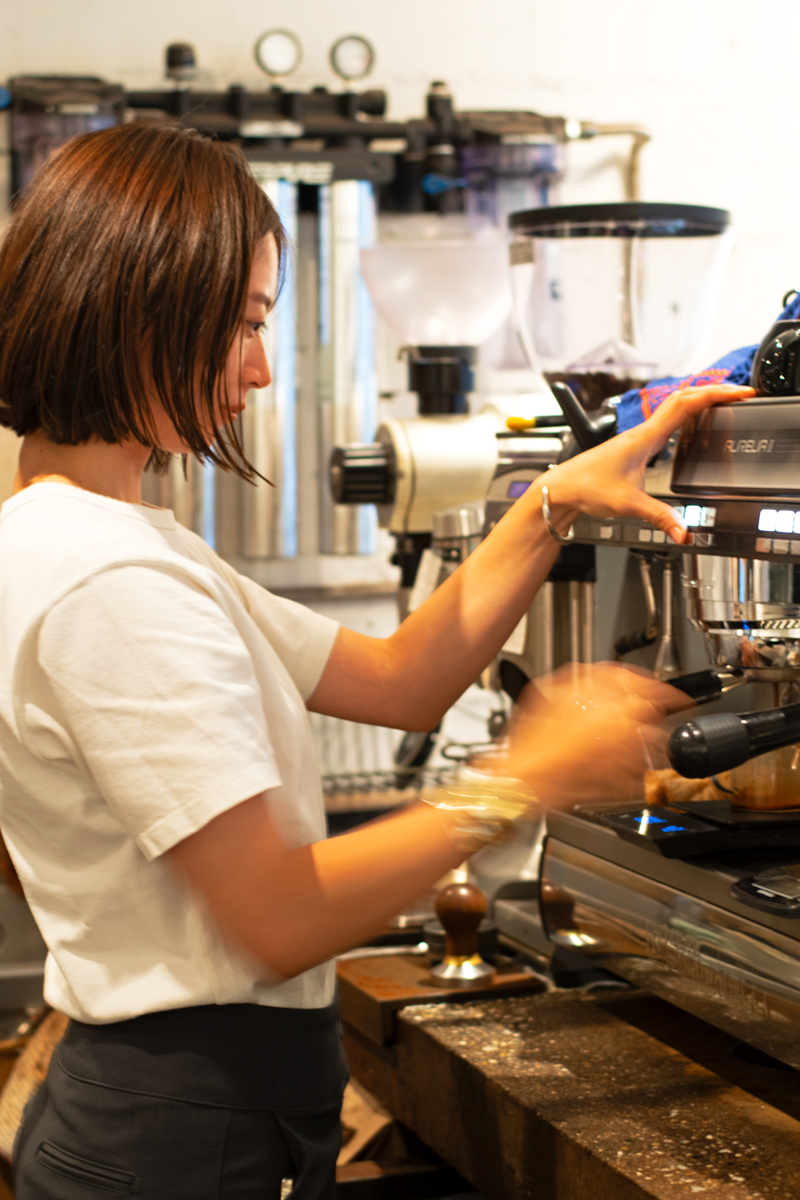
Most people probably associate Japan with wearing a kimono and drinking green tea like matcha. For hundreds of years, this was true and still is today.
But you might be surprised to know that modern-day Japan is a nation of coffee drinkers.
Japan's coffee culture is a fascinating blend of tradition, innovation, and convenience. From traditional Japanese coffee shops to streetside vending machines, coffee plays a major role in the daily lives of Japanese people.
For expats and foreign visitors to Japan, exploring the world of Japanese coffee brands is a must.
In my new guide to Japanese coffee, we'll delve into the history, culture, brewing methods, top canned coffee brands in Japan, most popular coffee chains, and everything else coffee.
It's time to spill the beans! My secrets are out of the coffee bag.
Mmm, do you smell coffee now?
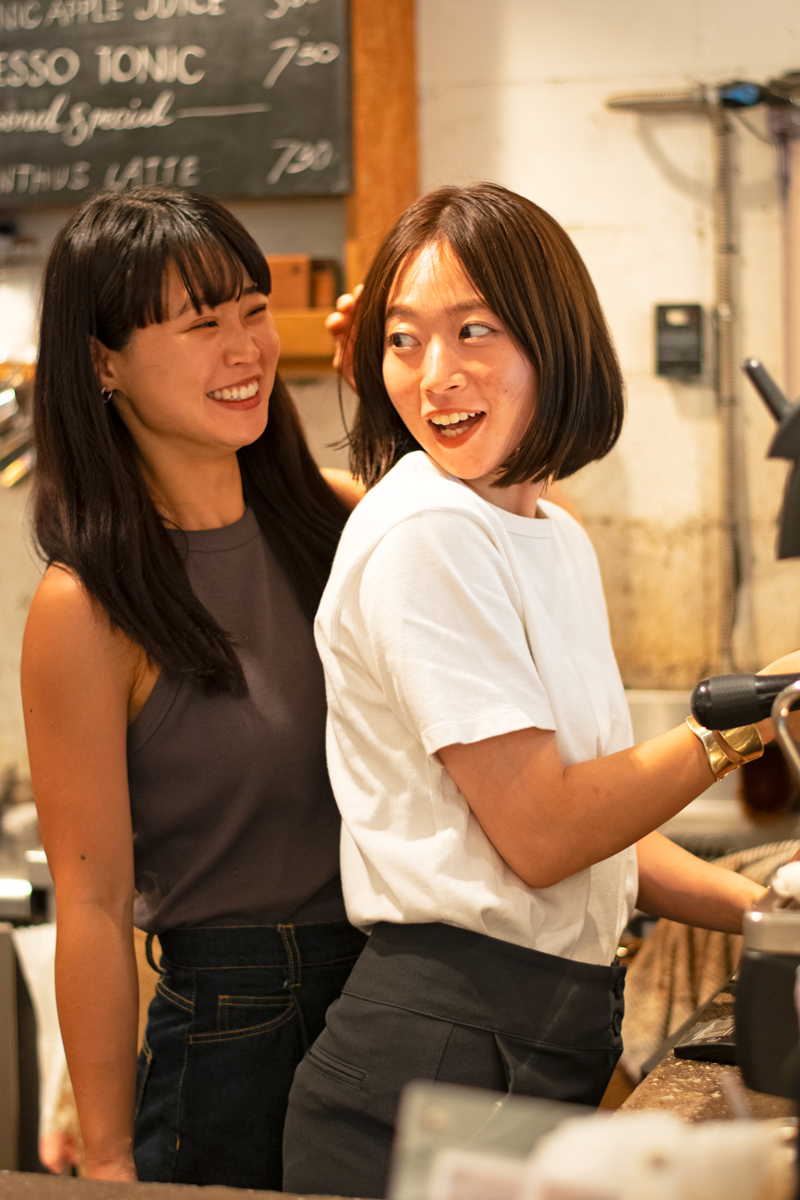
Japanese Coffee Culture and Traditional Japanese Coffee Shops
Japanese coffee culture is steeped in a rich history, influenced by both Western traditions and unique Japanese brewing methods.
Traditional Japanese coffee shops, known as kissaten, offer a cozy ambiance and a wide range of coffee products. These shops often serve hand-dripped coffee, providing a personalized coffee experience where coffee enthusiasts can enjoy a variety of beans, including light roasts, dark roasts, and specialty blends.
Japanese coffee is typically known for its smooth and clean taste, with an emphasis on balance and harmony.
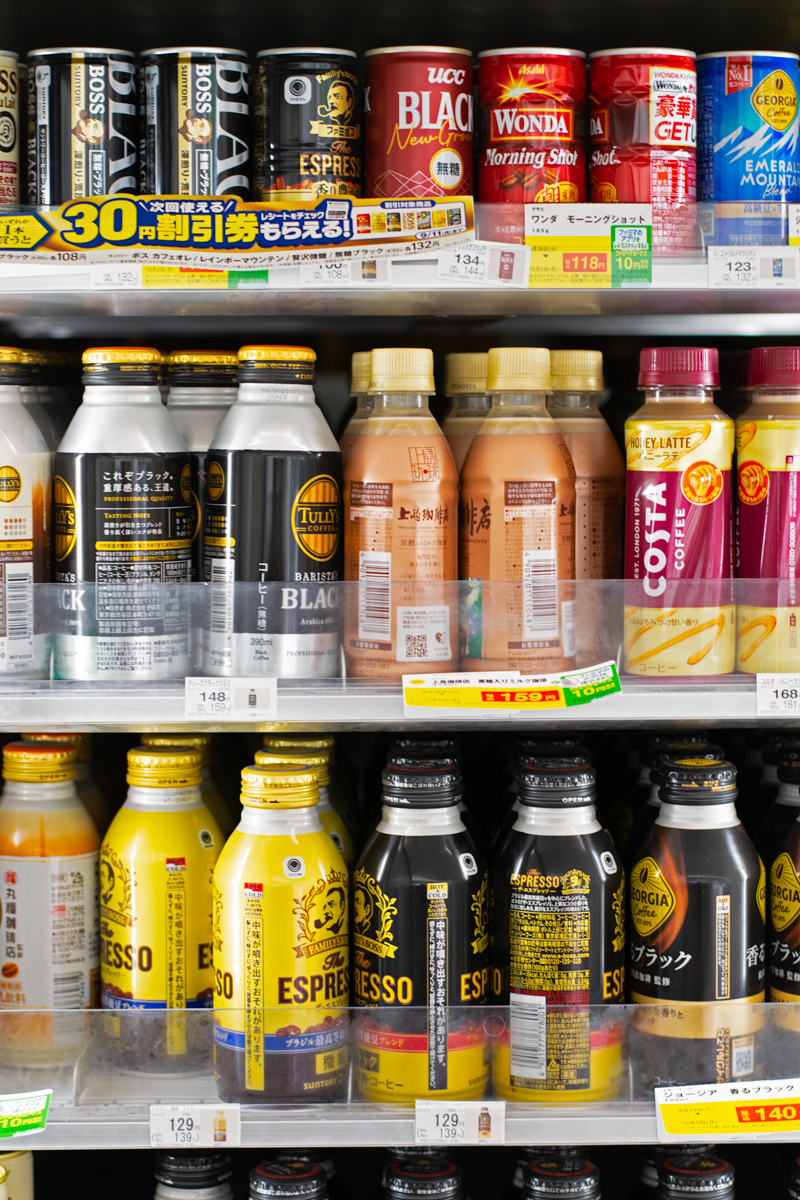
Why Is Canned Coffee So Popular in Japan?
Any salaryman will tell you the dominance of canned coffee in Japan comes down to convenience. Affordable, ready to drink, and portable — Japan's fast-paced and busy lifestyle demands that coffee be canned.
With long working hours and a culture that values efficiency, canned coffee offers a quick caffeine fix. And those hot little cans make great hand warmers for those winter treks from the station to the office.
It's no surprise then, that every convenience store and supermarket in the country carries these little cans of caffeine goodness. And you’d be hard-pressed to find a city block in Japan without a vending machine stocked with canned coffee.
In the winter, the vending machines are often heated to keep your brew toasty, and in Japan’s humid summers, the cans are chilled to provide iced coffee.
The wide variety of flavors and styles available is another reason for the popularity of canned coffee in Japan. From black coffee to café au lait (pronounced as “café olé” or called “milk coffee” in Japan), sweetened or unsweetened, hot or cold, there are numerous options to cater to individual preferences.
Marketing has also played a role in the popularity of canned coffee in Japan. Catchy slogans, memorable characters, and engaging ads have helped establish canned coffee as a beloved and iconic beverage in Japan. Foreigners may even recognize a certain Hollywood star on their can; more on him later.
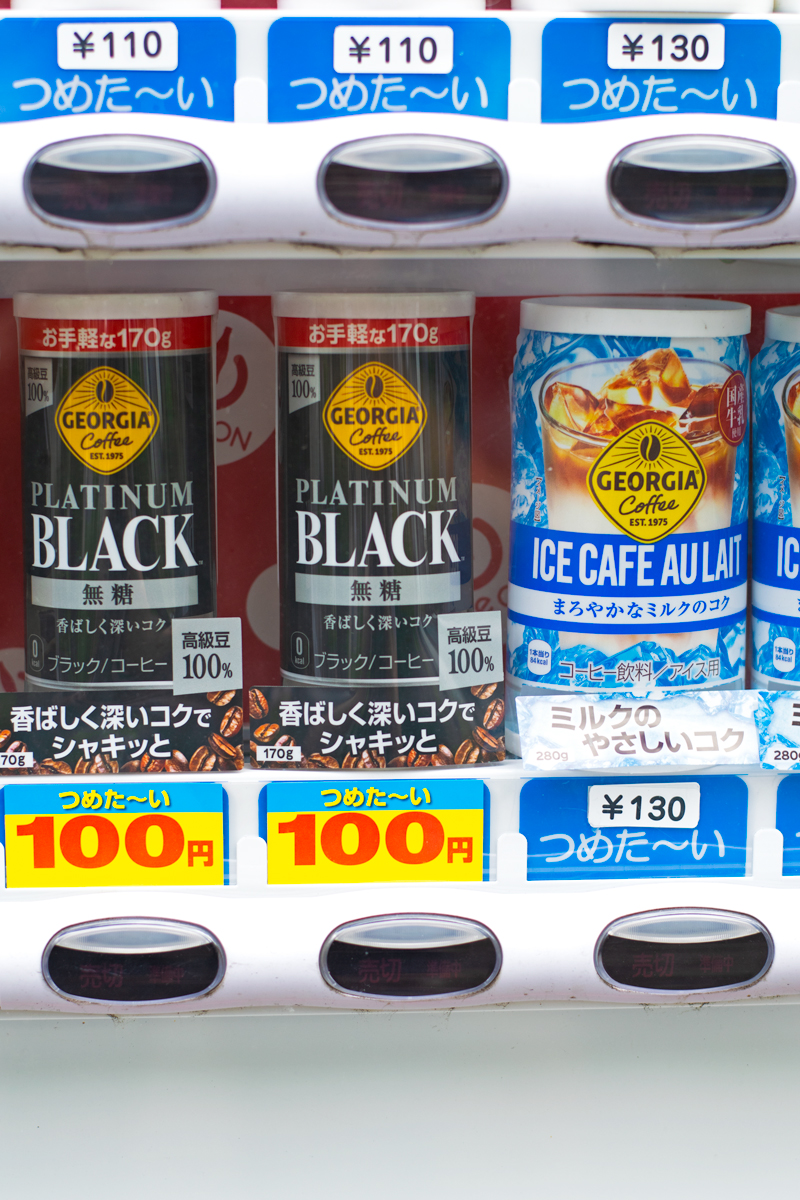
Japanese Canned Coffee vs. American and European Coffee
Japanese canned coffee has its own distinct characteristics that set it apart from American and European coffee. One notable difference is the brewing method.
While American and European coffee often relies on drip brewing or espresso-based methods, Japanese canned coffee is typically brewed using a flash brewing technique. This involves brewing coffee at a higher temperature and then rapidly cooling it, resulting in a unique flavor profile.
Japanese canned coffee tends to have a milder and less bitter flavor compared to its American and European counterparts. It is often described as smooth, with a rich aroma and a hint of sweetness. The focus on balance and harmony in Japanese coffee culture translates into a well-rounded and enjoyable coffee experience.
The Top 5 Canned Coffee Brands in Japan:
Read first: If you consider yourself a "coffee snob" back home, canned coffee is probably not going to be your thing. I get you. It's worth trying a few out just out of curiosity, but you may want to skim past this section.
For the rest of you with not-so-fussy tastebuds and not-so-full-of-yen wallets, let's crack this lid and take a gulp! Ahh.
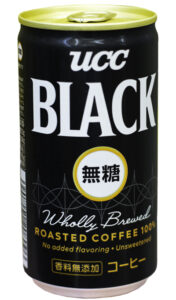
1. UCC (Ueshima Coffee Company):
UCC is one of Japan's leading coffee brands, known for its history-making and commitment to quality. Established in 1933, UCC has been at the forefront of the Japanese coffee industry. UCC's dedication to using high-quality beans and meticulous brewing methods is evident in its products.
Their range of canned coffee includes various flavors and blends, catering to different preferences.
"UCC Black Muto (無糖)" is 100% roasted sugar-free coffee with no artificial flavors or sweeteners. You'll find this can (hot and cold) at practically every convenience store in Japan.
If you've been to Japanese supermarkets outside of Japan, you may recognize their tan, white, and red colored cans of UCC Original Coffee with Milk. It's the world's first canned coffee with milk.
Overseas, you might also find their can with a silhouette of a palm tree and hibiscus flowers. That's their Hawaii Kona Blend with Milk.
Both the Original and Kona Blend are sweetened (25 g and 22 g of sugar).
Order online: UCC Original with Milk
UCC Hawaii Kona Blend with Milk
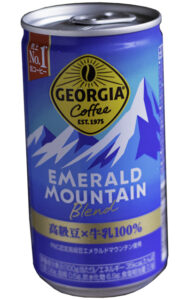
2. Georgia (by Coca-Cola):
Georgia Coffee has gained popularity for its wide range of coffee products.
They offer both hot and cold canned coffee options, catering to different seasons and preferences. Georgia's coffee beans are carefully selected and roasted to perfection, ensuring a rich and satisfying coffee experience.
One of their popular offerings is the Georgia Black Coffee, which delivers a smooth and full-bodied taste. It's a sugar-free dark roast with an added fragrance. It doesn't contain any other additives or sweeteners.
Their #1 long-selling Emerald Mountain Blend, a dark roast, has a creamy mouthfeel, a well-balanced flavor, and a lingering velvety aftertaste. Know that it does contain some added sugar and additives.
Georgia's commitment to quality and their ability to capture the essence of coffee in a can make them a top choice among coffee lovers.
Order online: Georgia Max
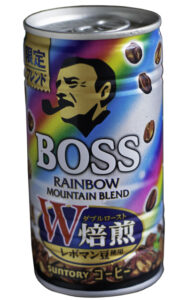
3. Boss (by Suntory):
Boss, another renowned brand in the Japanese canned coffee industry, is known for its high-quality beans and rich flavor. With a history dating back to 1992, Boss has become a household name in Japan.
Based on sales in 2022, Boss is the number one canned coffee brand in Japan.
Look out for the likeness of Tommy Lee Jones, who has played a significant role as the brand ambassador for Boss, adding a touch of charm to cans, vending machines, and ads. Boss offers a wide range of canned options.
Premium Boss is known for its velvety texture while Rainbow Mountain Blend offers a harmonious combination of flavors. Both showcase Boss's dedication to providing a perfect blend of taste and quality.
Boss Zeitaku Bito was created for coffee drinkers who don’t like bitterness and prefer lightly sweetened coffee.
Their newer line-up of "Craft Boss" in plastic bottles (larger size than cans) is a favorite of my colleagues at work and a friend from the USA.
Order online: Rainbow Mountain Blend
Boss (Flash Brew Cold Black Coffee- no sugar)
Boss (Flash Brew Café Au Lait)
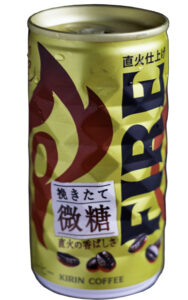
4. Fire (by Kirin):
"Fire" coffee offers a bold and intense flavor that coffee lovers should definitely try. With its deep and robust taste, Fire is perfect for those who enjoy a strong cup of coffee. Another reason this brand is popular is the fragrance.
They use coffee beans that have been fire-roasted; hence, the name "Fire".
Kirin Fire also has a diverse line-up of canned coffees. The can pictured above contains milk and some additives. It's lightly sweetened.
Fire Café Au Lait is their milk-based coffee with some added cream. It's only slightly sweetened.
Fire Black is their sugar-free black coffee. Its sweet aroma is balanced with bitterness and a clean, refreshing aftertaste.
Fire Black Awakening Dark Roast (目覚めの深煎り) comes in a larger can with a resealable lid. This one is praised for its fragrance but some reviewers say the aftertaste lacks sharpness.
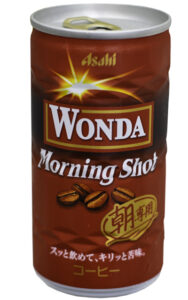
5. Wonda (by Asahi):
Wonda is known for its wide range of canned coffee options. Their products include different flavors, such as Wonda Morning Shot, which provides an instant boost of energy for those early mornings.
Wonda Morning Shot Black is their unsweetened version.
Wonda Gold is premium low-sugar canned coffee with a concentrated, high-quality taste.
Also popular is Wonda Kiwami (in larger cans with resealable lids). It's a low-sugar coffee supervised by a long-established coffee shop.
In Japanese, kiwami means extreme. A special dark roasting method is used to maximize the taste, richness, and aroma of the coffee.
No wonda this brand is one of the top choices!
Other popular brands of canned coffee in Japan
- Tully's
- Costa (by Coca-cola)
- Doutor
- Pokka Sapporo
- Muji
- Starbucks
Also, I have to make a special mention of Dydo Coffee. Since seeing my grandpa's old black-and-white picture in one of their TV commercials, I always see their vending machines and think of him watching over me. (The second picture from the start is my Grandpa Bob.)
Japan's canned coffee industry offers a diverse range of options for coffee lovers to explore. Whether for convenience, taste, or just to explore new grounds (pun intended), try the most popular Japanese canned coffee brands like UCC, Georgia, Boss, Fire, and Wonda. Immerse yourself in Japan's rich coffee culture by grabbing a can.
What's the Most Popular Japanese Coffee Chain?
Instead of going straight to Starbucks, how about trying one of these coffee chains?
You'll find these Japanese cafés throughout Japan. You'll typically find them inside train stations or nearby. If you search "coffee near me" in Google Maps, these are the names that are going to pop up.
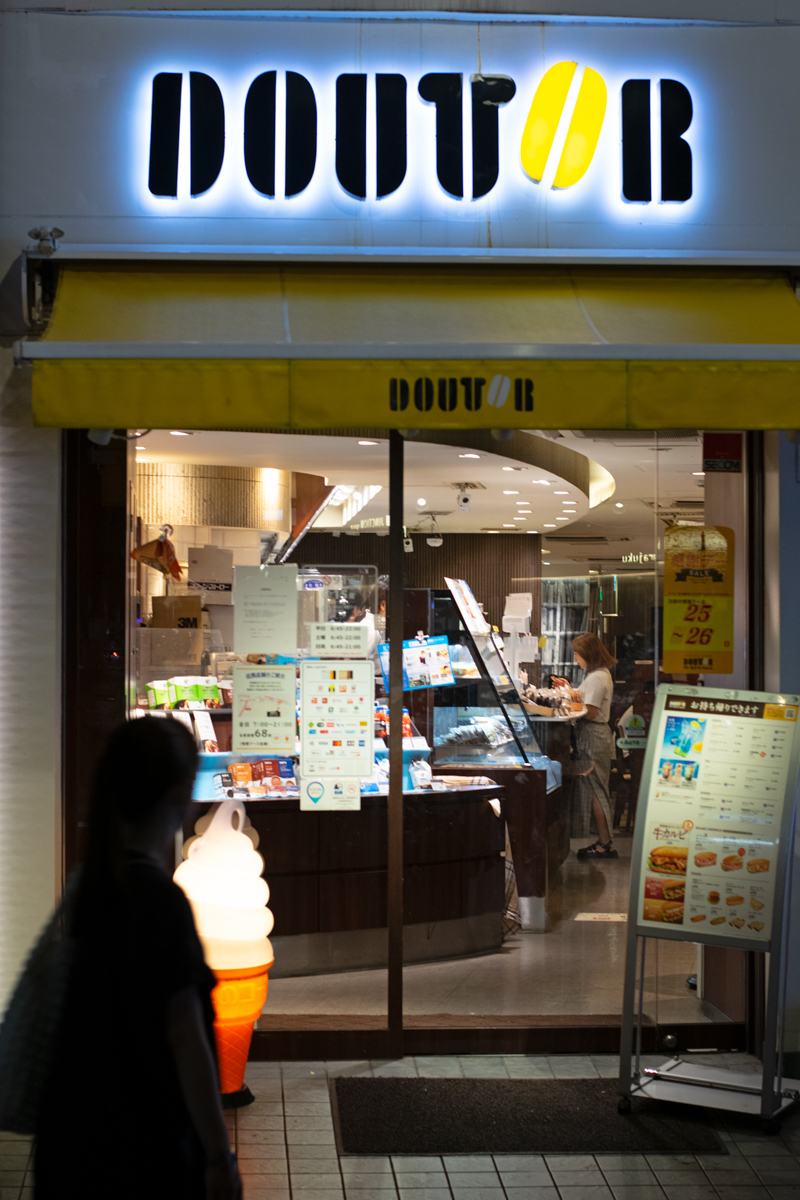
1. Doutor Coffee
According to their English website (with a picture of a hot dog with mustard on it), "more than 500,000 people visit Doutor Coffee Shop every day." While there are over 1,100 Doutor throughout Japan, there's not a single location outside of Japan, which always surprises me.
Doutor is great if you want an inexpensive coffee, warmth or air-conditioning, and consistently reliable wifi. All the Doutor I know have been renovated and modernized. They're always clean and the service is friendly.
Just make sure you got there with your expectations in check. Doutor is known for decent quality coffee at a reasonable price. It's by no means gourmet. Just take a look at the hot dog. Plain and simple, but still not bad. ($)
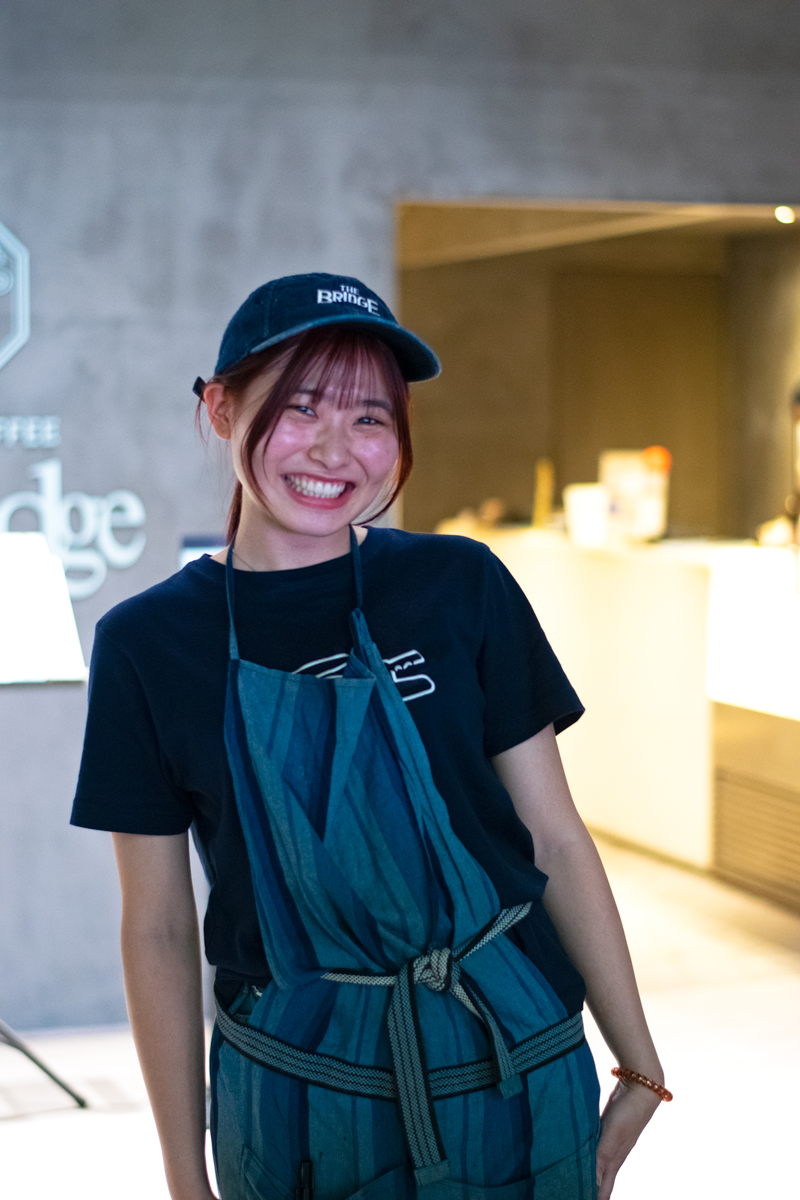
2. Sarutahiko Coffee
Originating in Ebisu, a relatively high-end area of Tokyo, Sarutahiko Coffee Co. serves high-quality specialty coffee. Most would consider their prices to be reasonable. They have about 15 shops in Japan, mostly in Tokyo.
If you're a tourist, a good chance to try Sarutahiko is when you pass through the new Harajuku Station. There's one somewhat hidden on the second floor called "The Bridge". It's one of my new favorite secret spots. On the weekend, expect it to be crowded!
Sarutahiko has award-winning baristas. At Japan's Latte Art Championship (2023), all three of the top prizes were won by Sarutahiko baristas.
On the menu, you'll find ice cream, homemade bread, pancakes, and affogato, depending on the location. When I checked Google Maps, their flagship location in Ebisu was rated 4.4. ($$)

3. Ueshima (UCC Coffee)
For coffee in Japan, UCC Ueshima Coffee Co. is almost as old school as it gets. UCC has been around since 1933. The company was also the pioneer of canned coffee in Japan in 1969. Nowadays, it's hard to imagine Japan without canned coffee.
Once you've heard of UCC, you'll recognize the three red-lettered logos everywhere in Japan. They still have about 100 stores around Japan. UCC is known for serving robust, full-body coffee in copper mugs.
UCC directly operates its Blue Mountain coffee estate in Jamaica and its Kona estate on the island of Hawaii.
On Google Maps, the star reviews of their cafes in Tokyo hover around 3.8 to 4.2. ($$)
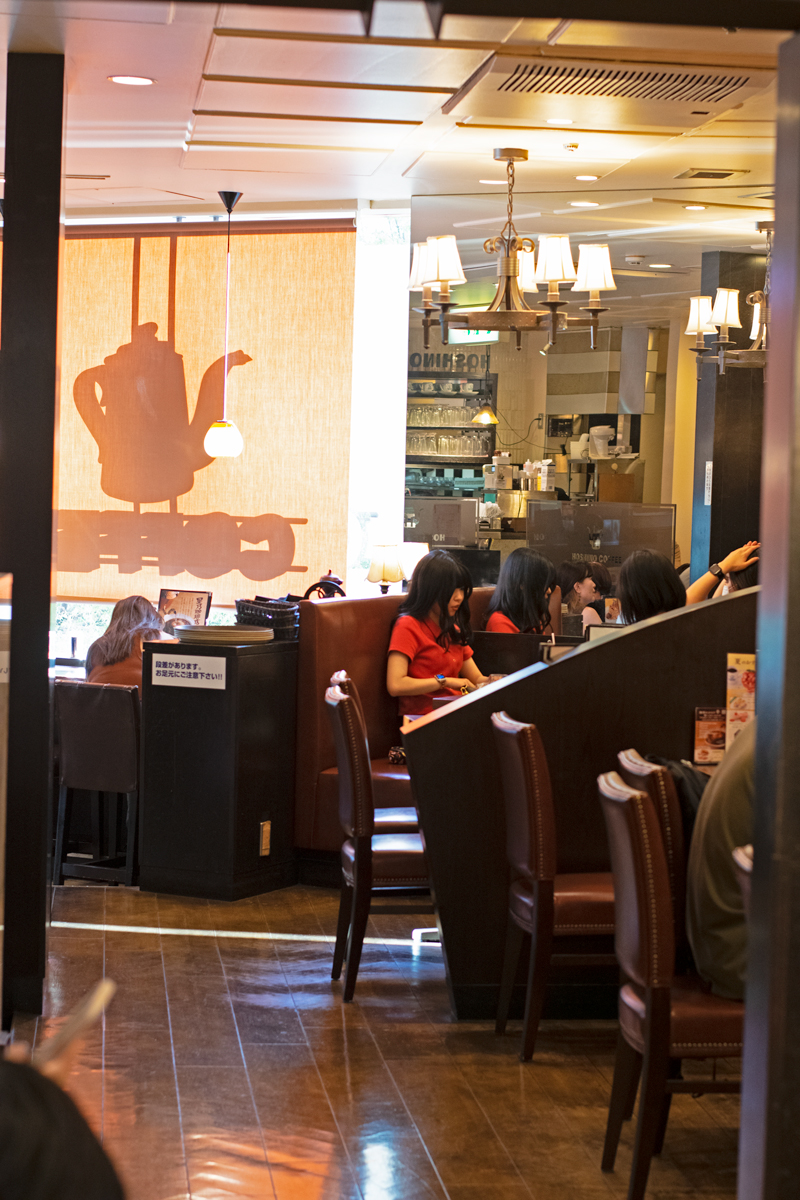
4. Hoshino Coffee
Hoshino Cafes are known for their hand-drip coffee, double soufflé pancakes (after 11 AM), and kissaten-influenced retro interiors. Like UCC, they served their iced coffees in copper mugs.
They also have a full-scale menu with sandwiches, beef curry, french toast, desserts, and fruit tea.
Hoshino uses a "direct-fire" roasting that they developed for their beans. Their main Hoshino Coffee Blend has a deep, lingering aroma. It has a rich but well-balanced sweet flavor with a hint of chestnut.
If you're a tourist, a fun location to check out would be the 2F location at MAGNET by SHIBUYA109. If you're lucky, you'll get a seat with a view of the busiest pedestrian crossing in the world. If the view is your priority, not the fluffy pancakes, to be honest Starbucks has the better view.
Hoshino's prices are mid-range. The "morning set" (before 11 AM) with toast and an egg isn't a bad deal for a light breakfast. ($$)
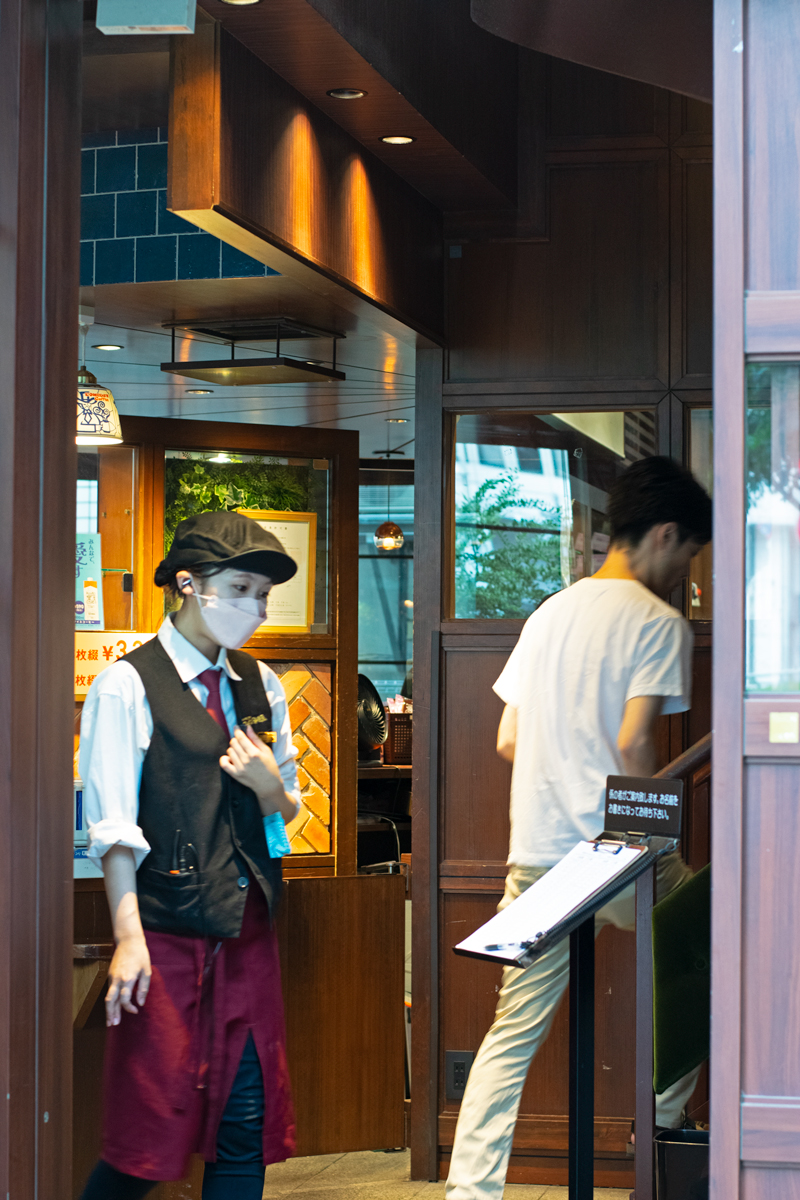
5. Komeda's Coffee
Originally from Nagoya, Komeda's Coffee has over 400 locations in Japan.
Komeda is known for its "free breakfast". When you order a drink before 11 a.m., you can choose a bread + egg side menu or Komeda's signature red bean past + butter, jam, or soy milk butter.
Komeda's commitment is to be a "living room in town" for their customers. They strive to create a space where everyone can feel relaxed and energized as if it were an extension of their own living room.
6. Maruyama Coffee
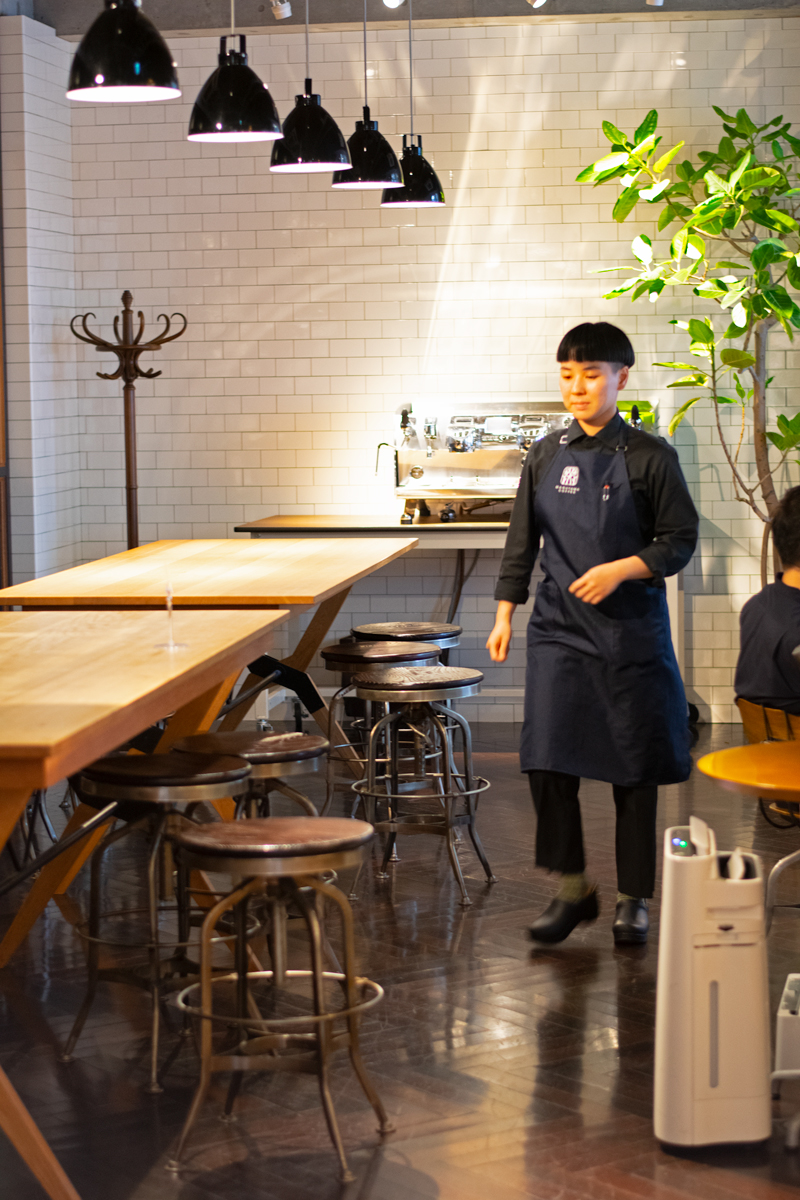
You'll typically find Maruyama cafes in the high-class parts of Tokyo and Japan. The main store is located in Karuizawa, Nagano.
They have other locations in Nagano Prefecture, one in Yamanashi Prefecture, and a few locations in some of the more affluent neighborhoods in Tokyo.
Now you can get coffee take-out or buy beans at a kiosk inside the new Shibuya Scramble building.
Maruyama coffee is of higher quality and slightly more expensive.
If you're looking for a more upscale cafe in Tokyo, I recommend the Nishi-Azabu location. The staff are friendly and professional. ($$+)
A few other cafe chains that are worth mentioning:
- Pronto
- Caffè Veloce
- Saint Marc Cafe
- Excelsior Caffe
- Cafe Renoir
- Beck's Coffee Shop
- Kohikan
- WIRED CAFE
Chains from different countries (like the United States):
Tully's Coffee: is a specialty coffee shop that's originally from Seattle, Washington. The Tully's brand has become popular all over Japan with over 700 locations. I'm a fan. ($$)
You'll find their canned coffee at many convenience stores and inside Ito-En vending machines.
Blue Bottle: is a specialty coffee company originally from Oakland, California. All of their coffees exceed specialty-grade standards. The majority of it is organic. You'll find Blue Bottles in Tokyo, the Kanto area, and Kansai, including Kyoto. ($$+)
You'll find Blue Bottle canned coffee in select stores that are higher-end.
All their coffees exceed specialty-grade standards.
Segafredo Zanetti Espresso: is an Italian cafe and bar headquartered in Bologna, Italy. If you are craving Italian espressos, you'll find Segafredo in Tokyo and some other locations around Japan. ($$)
Dean & Deluca: is a high-quality gourmet shop from SoHo, New York. In Tokyo, Dean & Delucas have a full cafe menu, espresso bar, bakery, and deli. Most D & Ds are located in Tokyo with a few in Osaka and other large cities like Fukuoka. ($$+)
Next, I'll introduce you to a low-cost option when you're on the go.
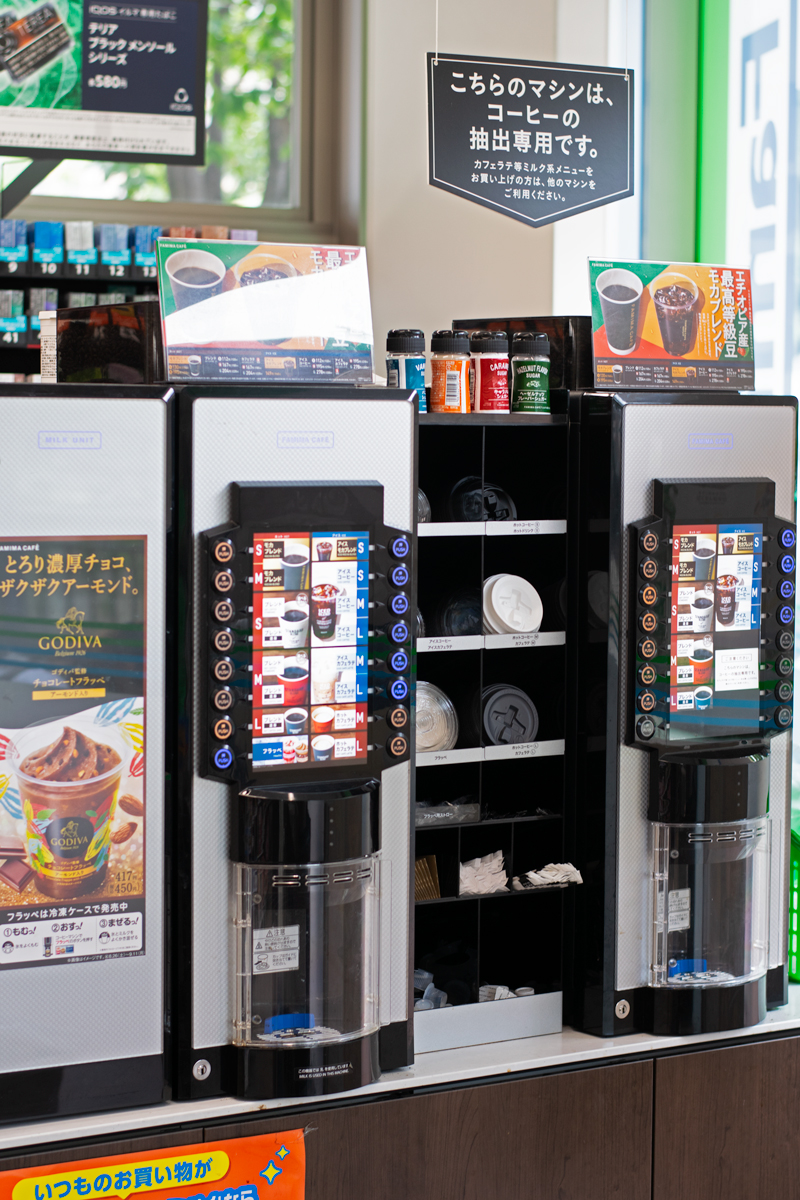
Freshly Brewed Coffee at Convenience Stores
In recent years, higher quality, freshly brewed hot coffee and iced coffee have become available at convenience stores across Japan.
Thanks to the "coffee war" between the konbini (convenience stores), the price is low and the quality is pretty good.
You can get a cup of decent coffee at a konbini for about 120 yen (small size) and up. Many convenience stores, definitely not all, will have limited seating available inside.
TIP FOR ORDERING COLD COFFEE: It's helpful to know that iced coffee is called "aisu ko-hi-" (アイスコーヒー) in Japanese. Asking for "ice coffee", rather than "iced coffee", will get you fewer confused looks.
If want to to sample convenience store coffee, here are your main options:
Lawson (MACHI café )

Lawson was the first convenience store in Japan to serve fresh brewed coffee. Inspired by McCafé, they launched MACHI café in 2011.
Lawson uses specially selected Arabica beans from Rainforest Alliance Certified™ farms. You can choose from a variety of coffee drinks: iced coffee (S/M and mega), decaf iced coffee (M), regular coffee (S/M/L and mega), decaf coffee (S), espresso lattes, double espresso lattes, cafe mocha, and more!
I'd recommend Natural Lawson here as well.
Natural Lawson (Machi café)

Family Mart (Famima Cafe)

At Family Mart, you can choose from their standard blend (S/M), iced coffee (S/M), cafe latte (M), and iced coffee latte (M).
7-Eleven (Seven Cafe)

7-11 has four types of beans: two kinds of light roasts and two kinds of double roast espresso. In surveys and in sales, 7-11 coffee has been ranked the best.
First, I highly recommend you want this video that teaches how to buy and make 7-11 coffee (in English). You'll be impressed!
Other convenience stores in Japan in addition to the big 3 also serve coffee:
NewsDays (EKI na CAFE) - You'll find this convenience store at JR train stations, both inside and outside the ticket gate.
Mini Stop (Mini Stop Cafe) - This chain says you can stay in their seating area as long as you like. Their Hokkaido milk soft-serve ice cream will go with your coffee.
Seicomart (Secoma café) - This is a very popular konbini in Hokkaido (Japan's northern island). You'll see them all over Sapporo. Look for their orange-colored sign.
There's also coffee (and free wifi) at McDonald's in a similar price range (120 yen and up).
Coffee Products at the Grocery Store
At a typical supermarket in Japan, you'll find a similar selection of coffee products.
Comparing all the supermarkets I go to in Tokyo, this is what you'll find on the shelves.
- coffee beans
- coffee grounds
- instant coffee
- individually wrapped instant coffee packets
- single-use drip coffee bags
- coffee pods
These are some of the most common brand names: UCC, Key Coffee, Blendy, Nescafe, Starbucks, Tully's, Mount Hagen (organic fairtrade), and Ogawa (organic). There are usually a few decaf options and one or two organic coffee products.
In the refrigerated section, you'll find these:
- canned coffee
- coffee in plastic bottles (larger sizes than cans)
- 1 L cartons of cold coffee
- cold lattes in cups with lids and plastic straws
- cold coffee in plastic bottles - black (unsweetened) and lattes (sweetened)
As a general rule, supermarket prices are slightly lower than at convenience stores or vending machines.
The best places to buy coffee beans in Japan
Local Coffee Shops: Lattest, Sarutahigo, Maruyama, etc.
Specialty Coffee Stores and Roasters: Fuglen, Verve, Switch Coffee, Allpress Tokyo Roastery, The Roastery by Nozy Coffee, etc.
Import Food Markets: Kaldi, Seijo Ishii, Jupiter, Nissin World Delicatessen, Costco,
etc.
Supermarkets: Unless it's a high-end supermarket like Kinokuniya, you'll find mostly cheaper and convenient options. They'll have limited economical options for coffee beans.
Online: Amazon Japan, Rakuten, iHerb, Japan Coffee Company
Coffee Delivery or Subscriptions: Fuglen, Sarutahiko, Onibus, Toriba, Kurasu, etc.
What I would do is find a local cafe you love, like Lattest in Omotesando. Ask the baristas who are highly trained and passionate about coffee. They'll know lots of other good places to buy coffee and probably have a friend working there.
If you have any specific questions I can help with, feel free to leave a comment below.
I can help you out with more specific recommendations in Tokyo, Sapporo, and Sendai.
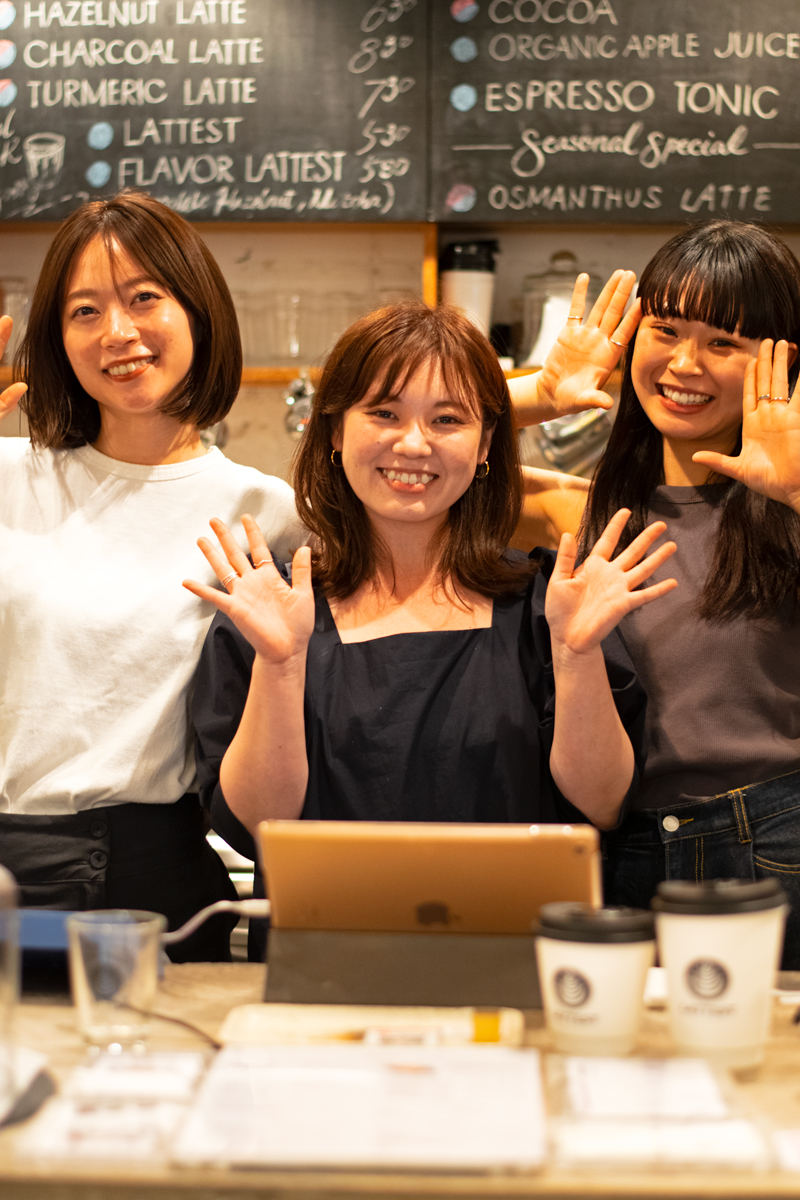
My Favorite Recipes that go with Coffee
Taiyaki with Fruit Filling (gluten-free/low carb)
Green Tea Ice Cream (dairy-free/vegan)




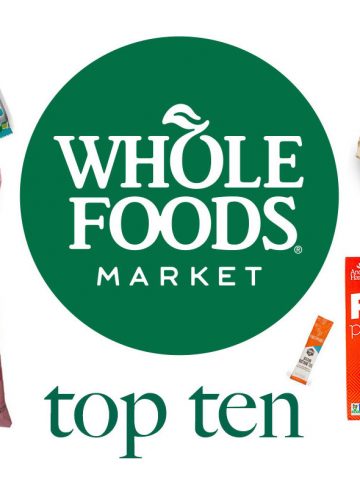
Leave a Reply